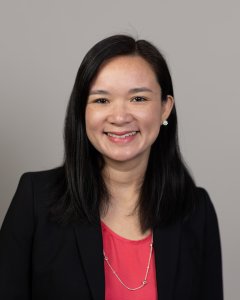
Dr. Jocelly Meiners
Associate Professor of Instruction
Department of Spanish and Portuguese
Today we’re spotlighting the open education work of UT faculty member, Dr. Jocelly Meiners!
Dr. Meiners is Associate Professor of Instruction in the Department of Spanish and Portuguese. A native of San José, Costa Rica, she came to Austin to attend the University of Texas at Austin, where she obtained a BA in French and Astronomy, an MA in French Linguistics, and a PhD in Hispanic Linguistics. She specializes in teaching and developing courses for Heritage Spanish learners, Spanish for Health Care Professionals, and courses with an Experiential Learning component.
A ardent advocate for open education, Dr. Meiners currently serves as co-director for the Texas Coalition for Heritage Spanish (TeCHS), where she collaborates with other Texas universities and works on promoting the use of Open Educational Resources to advance the field of heritage Spanish instruction.
Dr. Meiners brings her passion for open education to her instruction as well. Not only does she implement OER into her coursework, but Dr. Meiners also involves students with the creation of reusable assignments and other educational materials. Once completed, these resources can carry an Creative Commons license and be shared with the world.
UT Libraries is incredibly proud of Dr. Meiners’ contribution to the OER initiatives at UT Austin, and we can’t wait to see what she does next!
Learn more about Dr. Meiners’ work in this video created by the Center for Teaching and Learning to highlight her work on Open Pedagogy for Inclusive Learning Environments, and read her interview below.
Do you recall how you first became aware of open educational resources (OER) or the open education movement more broadly?
I learned about OER through COERLL (the Center for Open Educational Resources and Language Learning). I have been involved with COERLL for about 10 years, and a few years ago, we created TeCHS, the Texas Coalition for Heritage Spanish, to collaborate with institutions across the state to promote best practices and to encourage the creation and dissemination of OER for teaching Spanish as a heritage language,
Can you tell us about your OER project?
One of the projects I am most excited about is in a class that enacts the concept of Open Pedagogy, which takes a step further from just using OER in our classes to involving students in the creation of educational materials themselves. This is particularly effective in heritage Spanish courses, since the students come to the classroom with a wealth of cultural and linguistic knowledge that they can use to create authentic materials. Instead of having assignments be disposable, we have reusable assignments, which means that they can be used for other purposes. During my class, students work on three projects (a news article, a folk story, and a persuasive essay and poster) that become materials that other Spanish students and instructors can use in their classes.
What has been the greatest benefit of creating and using OER as an instructor?
It is very rewarding for students to know that their work is going to be used by other students, and it gives them a sense of pride, especially knowing that their heritage language and cultural content are valuable and can be useful to others.
In the video created by the CTL, they interviewed some students who talk about their experience in the course and how they felt about sharing their work.
What was the most challenging part of creating OER?
Sharing the student projects involves more work by both the students and the instructor to make sure that everything is high quality, free of typos, and ready to share. Also, students have to learn about Creative Commons licenses and how to provide appropriate attribution to any other resources used in their work.
How have your students responded to the material?
I have learned through this experience that students appreciate having OER, and thus they are also very happy to contribute and share their materials.
What would you say to an instructor who is interested in creating or adapting OER but isn’t sure how to get started?
I would say start with something small, try it out, and go from there. You don’t have to start with a huge project or try to create an entire textbook. You can start with an activity, a lesson, or any small resource that could contribute to the students’ learning process.


